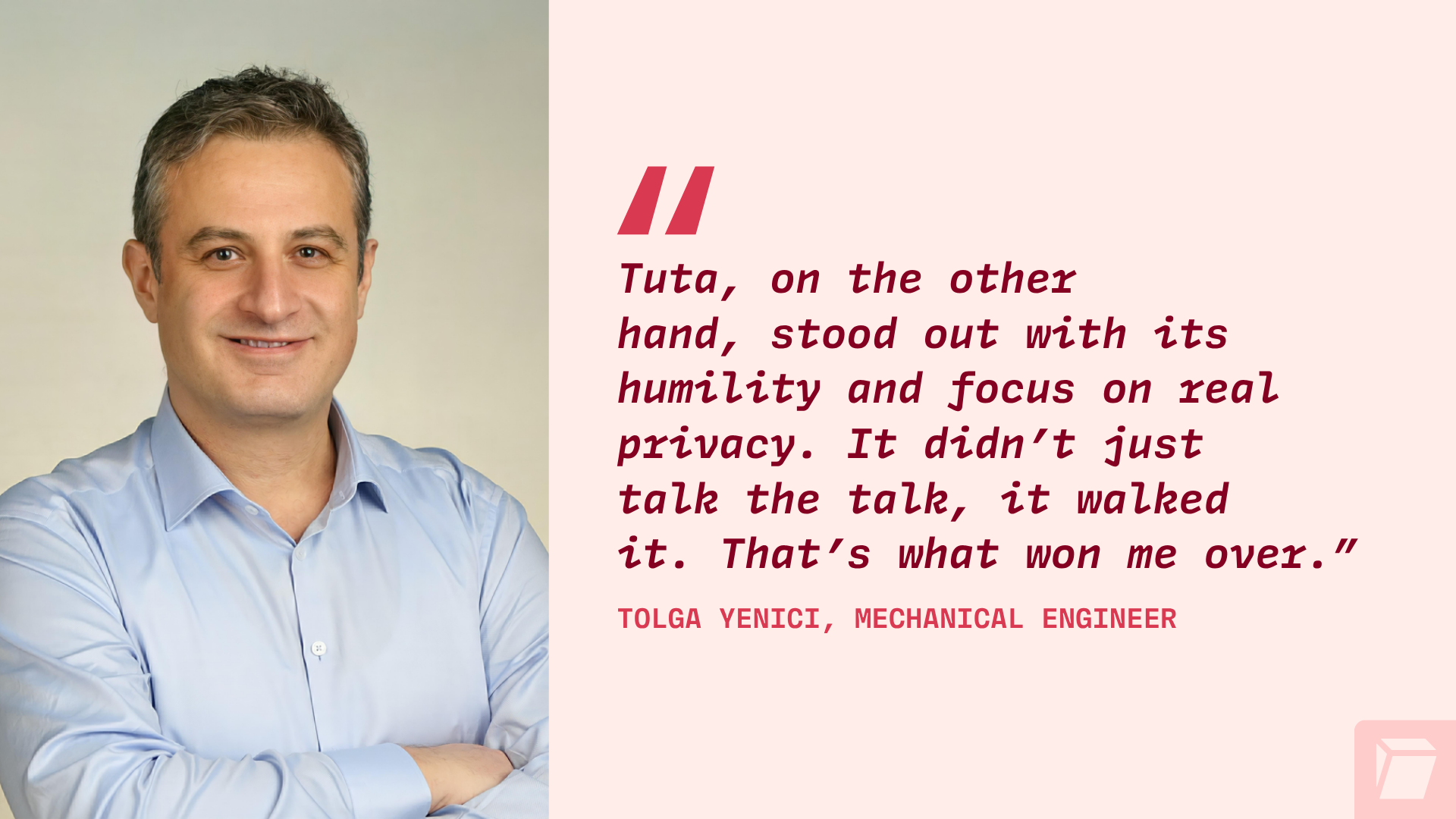Your voice, our drive: Presenting Tuta users from around the world.
Tolga Yenici used to be an average tech user, but now he is on a journey to choose private, open source tools like Tuta Mail. We sat down with him to find out why.
Wake-up call
How did your privacy journey start and why? Was there something that happened that made you want more privacy and security?
Yes, there was a pivotal moment. You might remember when Microsoft Edge silently imported data from Chrome without user consent. Microsoft later called it a mistake, as they often do, but for me, it was a wake-up call. It felt like I was living in a digital surveillance state.
For me, it was a wake-up call. It felt like I was living in a digital surveillance state.
Until that point, I hadn’t paid much attention to privacy beyond basic “tick-box” settings. But that incident pushed my patience over the edge. I immediately installed Linux Mint, began moving away from mainstream services, and started searching for a privacy-first email provider. That’s when I found Tuta.
Today, I use Debian Trixie on my laptop, and Tuta Mail is my go-to email service for all personal correspondence.
Are you only using Tuta Mail or other privacy-focused services?
I initially used both Tuta and Proton Mail. But over time, I noticed that Proton felt more like a polished product built for mass-market adoption, targeting Gmail users while leaning heavily on Swiss branding. It started to resemble a Silicon Valley startup wrapped in Alpine scenery.
Tuta, on the other hand, stood out with its humility and focus on real privacy. It didn’t just talk the talk, it walked it. That’s what won me over.
When did you first sign up, and do you have a free or paid Tuta plan?
I first signed up under an alias, just to test the waters. Once I realized how solid the service was, I registered with my real name about a year ago. I’ve been using it ever since and plan to stick with it long-term. I am subscribed to the Revolutionary plan.
In your LinkedIn post you mentioned that using Tuta is an unpopular opinion, why do you think that is, and why do you prefer Tuta?
Some companies develop fan-bases so loyal they act like unpaid brand ambassadors. Brave Browser is a good example. Although it competes with Chrome, its users often attack Firefox, which is also a privacy-focused browser, just to promote Brave. That kind of community behaviour often isn’t organic. It’s part of an aggressive marketing playbook. Or this is how it makes me feel.
I’m starting to see similar behaviour from some Proton supporters. When you mention Tuta Mail in a privacy discussion, someone inevitably jumps in to promote Proton, whether it’s relevant or not.
In the comments under my post, you’ll find users immediately shifting the conversation to Proton’s ecosystem, even though I was simply praising Tuta’s email privacy.
This kind of noise just reinforces my decision. I prefer products that earn loyalty through values, not volume.
Why Tuta Mail?
What made Tuta Mail stand out for you?
First, Tuta works seamlessly with my daily OS, Debian Trixie. I’ve been Microsoft-free for two years now and only access their services via browser if I must. Tuta’s AppImage client installs easily on Linux, even for free users. Unlike most other secure email services, Tuta offers free desktop client which is great.
Then there’s the post-quantum encryption feature. It’s not just cutting-edge, it’s the digital equivalent of sealing your letter in an envelope. When I served in the military, even my physical letters were screened before being delivered. Are we replicating that in the digital world? Why should email providers scan my personal messages under the guise of spam filtering?
Also, I’m an open-source advocate. I want to know exactly what’s running on my machine, my digital home. And while I appreciate free software, I also believe in supporting developers. Good services deserve funding.
Lastly, yes, Tuta being German-built adds a layer of trust. It’s not nationalism, it’s about a culture of precision, robust data laws, and software that’s built to last.
What is your favourite thing about Tuta Mail?
Being able to lock email content with a password, easily, is a killer feature. It ensures that only the intended recipient can read my message. That’s the kind of practical privacy I appreciate most.
Do you also use Tuta Calendar and Tuta Contacts? How have these features improved your workflow?
Yes, I do. I really appreciate how Tuta Contacts integrates with my Android device and how Tuta Calendar is built-in the emailing app. It helps me stay organized without relying on Google or Microsoft.
Have you been able to convince friends and family to start the privacy journey as well? What do you say to people who reply “But I’ve got nothing to hide”?
I’ve convinced a few, but others are fully locked into Microsoft Office. I just pray for their digital souls. As for the “nothing to hide” crowd, I once replied, “Then why do you use OneDrive’s Personal Vault?” That left one person completely speechless. If you’ve got nothing to hide, why do you lock your door?
Data Privacy around the world
Since you live in Canada, how do people there feel about data privacy? Is it important to people, why or why not?
Data privacy is taken seriously in Canada, both culturally and legally. Phishing alerts, scam warnings, and fraud protection are part of daily life. For example, banks don’t email sensitive content directly, you receive a notification, and must log in to read the actual message. Two-factor authentication is widely adopted. Cybersecurity professionals are in high demand, and digital privacy is seen as a basic human right. So yes, it matters here.
We always hear about legislative initiatives in the US and in Europe trying to undermine encryption. How is the legal situation in Canada?
Canada hasn’t passed any laws that explicitly weaken encryption, but it’s part of the “Five Eyes” intelligence alliance, alongside the US, UK, Australia, and New Zealand. This group has repeatedly called for ways to allow lawful access to encrypted communications.
At the same time, Canadian privacy laws, like PIPEDA, support secure data handling. There’s a tension between privacy rights and security demands, and while encryption is still protected, privacy advocates remain vigilant. So far, there’s been no legal requirement for backdoors, but the pressure exists in the background.
Tolga, thank you very much for the interview, it was great fun!


